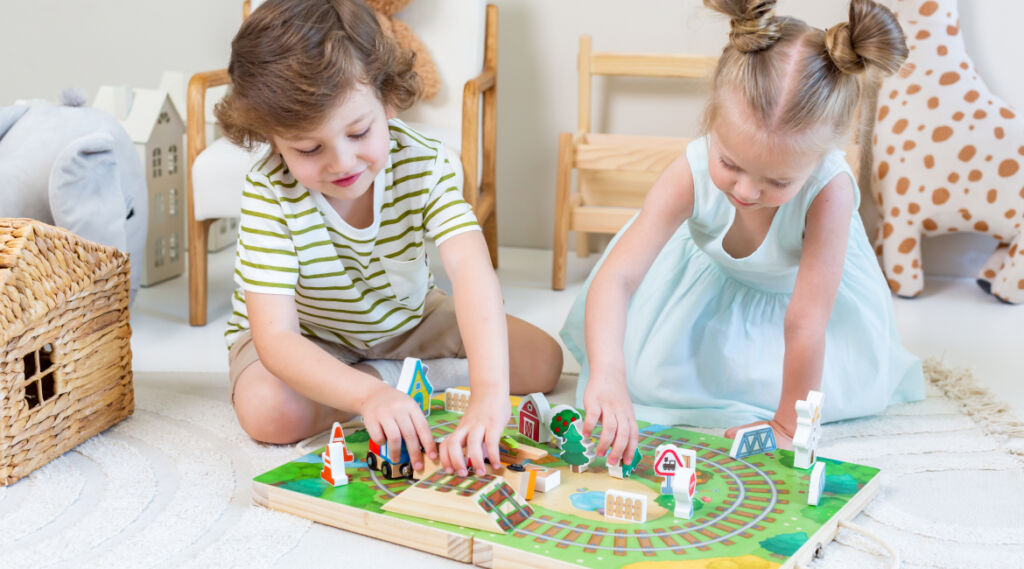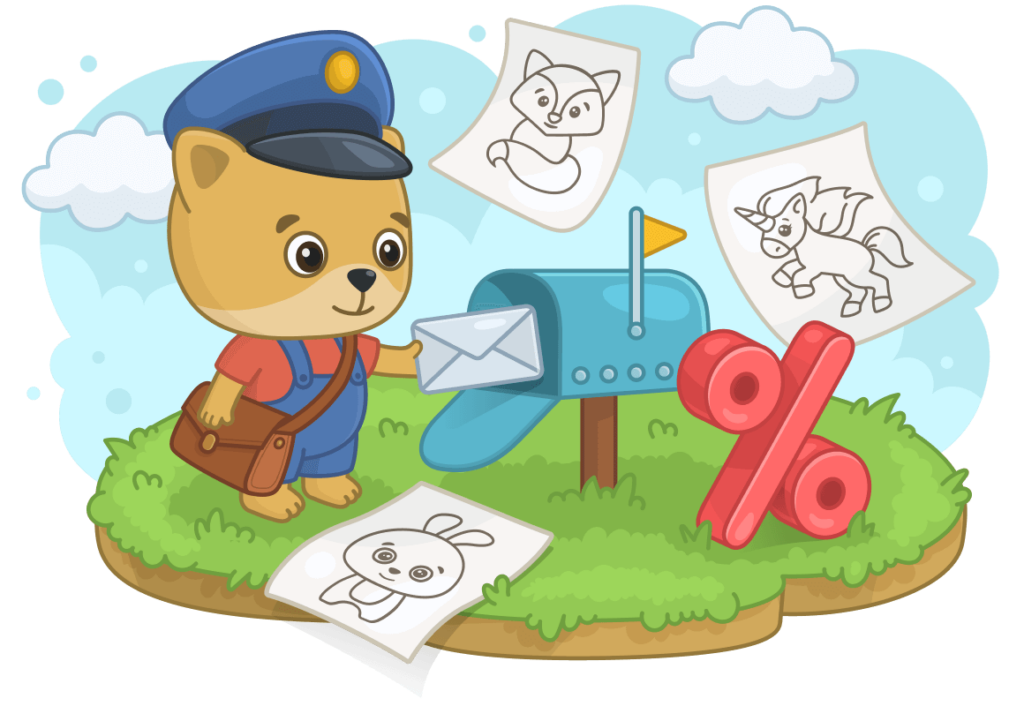Have you ever watched a little mastermind at work–painting, coloring, or building–and wondered, when did my child learn how to do that? The answers can vary. But surprisingly, many motor skills are built in infancy.
What Are Fine Motor Skills Examples?
Motor skills fall into two broad categories: gross and fine. Gross motor skills include movements governed by large muscle groups. Large muscle groups in the arms and legs work together to propel a child into motion. When a child develops gross motor skills, the results are improvement in walking, running, balancing, throwing, and climbing are all gross motor skills. Gross motor skills often require the use of a child’s entire body moving with coordination.
Fine motor skills, however, involve the use of smaller muscle groups, often the ones found in the fingers, hand, and wrist.
Why Are Fine Motor Skills Important?
Adults use fine motor skills everyday. We write, we prepare food, we use electronic devices. Fine motor skills are essential to complete thousands of tasks each day. We simply could not be independent without fine motor skills. These skills were developed when we were young with activities that are play based. It is important to develop fine motor skills while your child is very young. Toddlers and preschool children engage in activities for fine motor skills and then continue to excel in many areas.
- Handwriting preparation: children with well developed fine motor skills will hold utensils, including pencils, properly. This is the first step in learning how to write and become literate.
- Academic Readiness: Drawing, writing, and using classroom materials well is closely linked to success in school
- Hand-Eye Coordination: This skill development is essential for a child to visually guide hand movements. This skill is vital to catch a ball, thread a needle, and assemble puzzles.
- Independence in Daily Tasks: Fine motor skills are required for a child to complete daily tasks such as brushing teeth, dressing, and managing personal belongings.
- Social and Emotional Development: Fine motor skills encourage turn-taking, sharing, and collaboration; these foster a sense of belonging, self-esteem, and confidence.
Best Activities for Fine Motor Skills for Toddlers and Preschoolers:
Bimi Boo Classic Wooden Shape Sorter for Toddlers Ages 2-4 is perfect for little hands! When our youngest friends need to improve eye-hand coordination and small fingers need to learn how to place fingers around an object to grip and move it, this game gets it done! DIfferent shapes means hands and fingers will practice forming around a variety of objects. Your little one will enjoy hours of play–while improving their fine motor skills–with this Mom’s Choice Gold Award Winning shape sorting box on hand. This fine motor skill activity is interactive, and comes with eight shapes in four colors. And because Bimi Boo designed the game with a strategically placed silicone pad, noise is drastically reduced. Say goodbye to clinking and clanking!
Another great activity to help preschoolers develop fine motor skills is ‘Save the Stuffie.’ Loosely tie string or ribbon around five or six of your child’s favorite stuffed animals and see if your child can save them. This is also an opportunity for imaginative play. You and you child can develop a storyline around the events that led up to the tied up situation!
Sorting with small pieces is a terrific way to improve their fine motor skills. Simply take pieces of colored construction paper and lay them out on a flat surface like the table or the floor. Use smaller colored items, like buttons, round cereal pieces, or crayons. Watch your little one match the small colored items to the colorful sheets of paper. The older your child is, the smaller the items should be.
Games are a great way of teaching toddlers and preschoolers to improve their fine motor skills, and stacking items is a great place to start developing fine motor skills in your child. Toddlers should start with larger items, like blockers. Bimi Boo Kids has a great set called the Bimi Boo Tumbling Tower Game. The brightly colored wooden blocks are just the right size and shape for little hands to grip and stack. As children grow older, they can start playing the tower game, building and removing the blocks to see how high it can get before it topples over! These blocks are designed with six vibrant colors and animal faces that kids will love. This game encourages social interaction and collaboration as well as developing fine motor skills.
The Bimi Boo Wooden Color Rings Sorting Board, Hand Eye Coordination Toy is perfect for older toddlers who are ready to develop fine motor skills, specifically eye hand coordination. Make skill learning fun with 45 round, colorful rings and 10 number tiles. Children will have hours of fun practicing sorting skills and problem solving play. This multi purpose toy is ideal for 2-4 year olds.The Bimi Boo Wooden Color Rings Sorting Board also reinforces number and color recognition, counting skills, and stacking mastery!
Kids love technology. Fine motor skills are developed with these Bimi Boo Kids learning apps: Kids Cooking Games and Drawing Pages! Kids Cooking Games is designed to teach your little one about cooking, with recipes you and your little chef can explore together. Mini games are full of education experiences, and creativity is encouraged with every tap and swipe!
With Bimi Boo Kids Drawing Pages, your growing artist can practice tracing, which is key to improving their fine motor skills. Children will enjoy painting pictures digitally with a rainbow of colors and a large selection of images. Your little one can even animate the image when the coloring is complete! All of these screen manipulations reinforce fine motor skills.
Unique Fine Motor Skill Fun
Fine motor skill activities should be fun for everyone, and these unique ideas will be amusing!
Do you have small foods around your house? Think marshmallows, cherry tomatoes, or grapes. Add toothpicks, and you have an inspiring, challenging fine motor skills activity that is also an edible treat! Stick one end of a toothpick into a small piece of food and the other into another piece, and build a structure! You can race or see who creates the tallest building. These structures resemble tinker toys when they are complete. Children experience handling different textures and sizes of items in this activity–and clean up is a yummy snack!
Most parents have empty shoe boxes lying around the house. This activity makes use of one! Draw one resembling a washing machine. Cut a hole on the top and get ready for some imaginative play. Grab a pair of tongs from the kitchen and ask your child to pick up (clean) socks one at a time and put them into the washing machine. Shake up the box and make ‘washing machine’ noises, and then complete the task in reverse. Once the ‘laundry’ is finished, see if your child can tackle the extra challenge of folding each sock in half.
Braiding is another fine motor skill older elementary-aged children can practice. This activity can be completed with string, yarn, shoelaces, lanyard (known as ‘gimp’ in some locations), as well as hair. Braiding is an advanced fine motor skill that incorporates muscle groups from several fingers at once.
Button Push is a great activity for younger children with smaller hands. This simple activity uses buttons of different sizes. Prepare an empty shoe box by cutting slots on top, short, medium and large. Your little one will enjoy trying to place each button into the slot where it fits.
These fine motor skill activities will prepare your child for gripping a pencil, independently completing everyday tasks, and sharpen eye hand coordination. Studies show that children who have developed fine motor skills as toddlers benefit from longer attention spans and master of family tasks at younger ages. Remember, the best activities are fun, engaging, and the ones you can enjoy together!
Debra Kidder
Certified Online Educator K-16
Co-author of Distance Learning Workbook
B.A. in Education, M.A. in Literature



